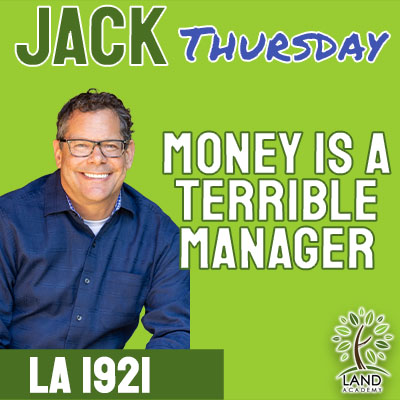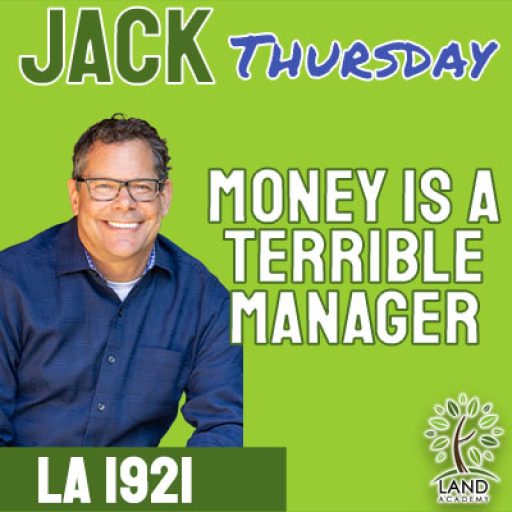Transcript:
Steven Jack Butala:
Jack and Jill here.
Jill K DeWit:
Hi.
Steven Jack Butala:
Welcome to the Land Academy Show, entertaining land investment talk. I’m Steven Jack Butala.
Jill K DeWit:
And I’m Jill DeWit, broadcasting from the Valley of the Sun.
Steven Jack Butala:
Today’s Jack Thursday and I’m going to talk about how money is a terrible manager.
Jill K DeWit:
Yeah, you know what? I hate working for money.
Steven Jack Butala:
Yep.
Jill K DeWit:
Money is a jerk.
Steven Jack Butala:
If you work for your money, it’s the worst boss you’re going to have.
Jill K DeWit:
Totally. He’s really unforgiving. Notice how I’ve made it a he. It’s not a she.
Steven Jack Butala:
Money is a he.
Jill K DeWit:
Money’s a he. And he is a jerk, he’s demanding, he’s unforgiving. He always wants more.
Steven Jack Butala:
And he has no emotion.
Jill K DeWit:
He’s never enough, no emotion.
Steven Jack Butala:
And there’s no…
Jill K DeWit:
Exactly. He complains all the time.
Steven Jack Butala:
There’s no explanation.
Jill K DeWit:
Exactly.
Steven Jack Butala:
There’s no explaining why you were late.
Jill K DeWit:
Oh yeah, no.
Steven Jack Butala:
It’s unforgiving.
Jill K DeWit:
Totally, that’s right. And he always says, “You didn’t give me enough. You’re not doing enough.”
Steven Jack Butala:
Well, you wanted that nice bracelet last week, so here we are.
Jill K DeWit:
Exactly. That’s money. Man, somebody needs to fire that guy.
Steven Jack Butala:
He’s going to fire you before you fire your money.
Jill K DeWit:
That’s true. We need to sabotage money and get him out of there. Cool.
Steven Jack Butala:
Before we get into it, let’s take a question posted by one of our members on our landinvestors.com online community. It’s free, and please don’t forget to subscribe on the Land Academy YouTube channel. Comment on the shows you like.
Jill K DeWit:
Okay. Martin wrote, “I am brand new to Land Academy. I have a full-time job and three little kids.”
Steven Jack Butala:
Oh boy.
Jill K DeWit:
“And I want to be successful. How much time do I really need to devote to this?”
Steven Jack Butala:
First of all…
Jill K DeWit:
Go ahead
Steven Jack Butala:
Everyone has been where you are.
Jill K DeWit:
Okay, good. I wasn’t sure where you’re going with this.
Steven Jack Butala:
So it’s not like, “Darn it, I’m too late to the party, or man, I made a bunch of mistakes. I shouldn’t have had that third kid.” Maybe that’s true, but that’s up to you.
Jill K DeWit:
That’s where I thought you were going with this.
Steven Jack Butala:
So you need to really put your head into the right mindset where everyone’s been in some version of this situation. Just about everyone. There’s some exceptions that our world likes to make a huge example of like people born with a silver spoon in their mouth, but they have their own set of problems that I would argue are way worse than tackling what you’re about to tackle.
Jill K DeWit:
That’s true. So what would you tell Martin?
Steven Jack Butala:
Get organized and hopefully the mother of your kids or whoever your partner is, is on board. Boy, it’s really going to make it much, much, much harder…
Jill K DeWit:
They have to be on board.
Steven Jack Butala:
…if you’re not a unified front with whoever you’re involved with the kids. And that’s an issue that if you’re not, then that’s overcomeable. You can find a person that is on board.
Jill K DeWit:
Well, you can get them on board. That’s my goal. You need to have, now we’re taking it in a different direction.
Steven Jack Butala:
[inaudible 00:02:58] I think we should, though because I think this is important.
Jill K DeWit:
It is true. I have talked to many wives and husband and wives and said, “What do you need to know?” And I think part of it is because we’re a couple, it makes it easier for other people to embrace us, other couples and women to go, “All right, Jill’s there.” Jill’s there is going to make sure this all doesn’t go sideways.
Steven Jack Butala:
What I’m getting at is we didn’t start as a couple.
Jill K DeWit:
True.
Steven Jack Butala:
We started with other people and…
Jill K DeWit:
True.
Steven Jack Butala:
…they turned out not to be the partners that we wanted individually.
Jill K DeWit:
That’s a whole ‘nother show.
Steven Jack Butala:
So we found the partners that we wanted.
Jill K DeWit:
Well, let me on. I have one thing to say about that and I want to get back to the question, which is we have a member in… We just sat in career path five last week and I thought this was brilliant. One of our members, kind of in a similar situation with you, he’s got a two-year-old and another one, or one or two. I don’t know how many kids he’s got. But anyway, he very smartly bought a case of his wife’s favorite wine and he only brings a bottle out when there’s something to celebrate. So she knows when this bottle’s coming out, he did some great deal and we’re something we’re celebrating.
I’m like, “That’s brilliant.” Because that gets her excited. That’s his way of telling his wife, “We’re doing great baby. Here comes this fancy wine.” I’m like, “That’s awesome.” But back to the Martin’s question is how much time? You know what, Martin? As much as you can, as much as you can because it’s just going to get you there faster. And the more organized you are, the easier it’s going to be. If you’re organizing, you give yourself tasks and you divide it out, then it’s not going to feel like a crazy week or a lot going on. This week is picking an area and I allotted two hours on Monday night and I have this much time on Thursday. And then, on Sunday afternoon while the kids are at the park, I’ve got my laptop on my lap and I’m wrapping it up.
Steven Jack Butala:
We’ve all heard these stories of people writing novels in between four o’clock and 5:30 in the morning.
Jill K DeWit:
True.
Steven Jack Butala:
Before everybody gets up, before the kids get up.
Jill K DeWit:
True.
Steven Jack Butala:
And then, they write half of a chapter or even just a paragraph every day.
Jill K DeWit:
True.
Steven Jack Butala:
And at the end of that, if they’re extremely talented, end up with Harry Potter. And so, this is no different. If you have to put an hour and a half in, go to bed as early as you can, go to bed with a toddler at the same time that the toddler’s going to bed and get up or before them or however you can manage it. That’s just what this takes.
Jill K DeWit:
True.
Steven Jack Butala:
And Jill and I have been through this collectively and separately.
Jill K DeWit:
Remember the 4AM club?
Steven Jack Butala:
Yep, the 4AM club.
Jill K DeWit:
We had a group inside [inaudible 00:05:44]. They may still be floating around there. I bet they are. I’m sure there is a version of this right now. But they called themselves a 4AM club. They found that they were all online at the same time and it was like 4AM.
Steven Jack Butala:
In Discord.
Jill K DeWit:
Uh-huh. And chatting and working together on deals because that’s when they could get it done. Like you just said, they had to get up at four, they could put in from four to five, or 5:30, whatever it was. And then, they get ready, and then they wake the kids up and start their day. And that’s what they do, and it got them there.
Steven Jack Butala:
The short answer to the question is you have to do whatever it takes and without being so ultra organized, it’s going to hurt more.
Jill K DeWit:
True. That’s true.
Steven Jack Butala:
It’s just like working out. And it’s going to feel great when you’re done and it’s terrible while it’s happening.
Jill K DeWit:
I’ll leave it at that.
Steven Jack Butala:
Today’s Jack Thursday. I’m going to talk about how money is a terrible manager. This is why you’re listening, you do not want your money to manage you. And the vast majority of people, me included, have gone through… A lot of people probably go through it their entire lives. They let money manage them. I know I did, and I’m pretty sure Jill did at the beginning of our lives. We did what everybody told us to do. We went to school at whatever school we could handle and stand, and went out and got a job, and then started moving forward or backward, depending on how it goes. But the more stuff you accumulate, you’ve got a bunch money coming in, you start buying a house and a car, and a car payment and whatever else…
Jill K DeWit:
And a boat and a cabin.
Steven Jack Butala:
Money to laugh at you in the face.
Jill K DeWit:
Yeah.
Steven Jack Butala:
Yep, you bought up a house with a mortgage that’s 50% of what money coming in every month. Now, you’re spending it on a house that may or may not make money in the end. You don’t know.
Jill K DeWit:
That’s true.
Steven Jack Butala:
But that’s what we were told. Our parents made a lot of money on their houses, so I guess we should, and not the case at all.
Jill K DeWit:
Right.
Steven Jack Butala:
You have to get your arms around how much money is coming in, how much money is going out. And if you can’t stand, like me, the idea of your money managing you, you want to flip that situation around, you’re going to have to figure out how to scale the money that you have and create a revenue stream for yourself that is not tied to your time. Meaning in four or five hours, I can have six deals under contract, and then I can start to get everybody in motion. A transaction coordinator or whoever’s involved in my business at the time, real estate agents, multiple real estate agents to start using my money and not taking my time to make me more money. Because it will control you. And the natural state, if you plant a garden and you don’t do what it takes to manage the garden and for however you control the weeds and bugs and all of that, you’re going to end up with a disaster, with an unusable product.
Jill K DeWit:
Right. It’s just amazing how… There’s times you make decisions based… You know what? Let me run this by you. So I’m letting my money manage my life. You just explained the bad way, how you don’t want to do it. But what about… Hold on a second.
Steven Jack Butala:
I just explained it the bad way.
Jill K DeWit:
Explain the bad way, not exploited or whatever it is. Let me back up. There’s times where there’s a situation where you might have your money manage your life a little bit based on… Here’s what I’m trying to get at. How many people live in places that are way too much money than they can afford?
Steven Jack Butala:
A lot of people.
Jill K DeWit:
Okay. And they have no real way to change that financially. So in that situation, maybe they make a decision to move somewhere where they can afford because it’s going to… How about this situation just said, half of my income is going to my townhouse because I live in Seattle. Well, you know what? I could leave Seattle because I’m remote anyway and I can work somewhere else and it’s a whole lot less expensive, so I’m letting money drive that decision, but I don’t think it’s a bad decision. What do you think about that?
Steven Jack Butala:
I think that moving is an amazing way to save an incredible amount of money. I think that you need to sit down with a yellow pad of paper or an Excel spreadsheet or whatever makes sense to you and look at your money, where it’s going and be willing to adjust to some of the changes if this is really, really important to you. Otherwise, very, very quickly, it’s going to control you maybe forever.
Jill K DeWit:
Yeah. It’s depressing.
Steven Jack Butala:
It’s terrible. This is a terrible topic to talk about, but it’s the end of the year and I can’t count the number of times that I would, back in the day when it was controlling me where you go to the ATM machine and you’re like, “Maybe I can get 20 bucks out of this. I don’t know.” I had a whole almost…
Jill K DeWit:
Is it a young rookie thing?
Steven Jack Butala:
Yeah.
Jill K DeWit:
Because I did that too.
Steven Jack Butala:
Absolutely.
Jill K DeWit:
I remember going through the grocery store with a calculator.
Steven Jack Butala:
[inaudible 00:10:54].
Jill K DeWit:
I knew exactly how much I could spend and I had to stand around the grocery store, make decisions with my calculator in my hand on what we could afford and couldn’t afford.
Steven Jack Butala:
I remember literally taking home economics in high school and learning how to bake a cake and cookies and all kinds of awesome stuff and…
Jill K DeWit:
You don’t do that for me.
Steven Jack Butala:
…learn how to sew a button on and all of that. And then, there was a tiny little module about budgeting, and that’s it.
Jill K DeWit:
Oh, isn’t that silly?
Steven Jack Butala:
My parents never… And I’m not complaining, I’m just saying that’s what this is. That’s the way we are. That’s the environment that we live in and I don’t think… Our kids don’t seem to have this problem and it’s probably… I don’t ever remember. No, I did with a couple of them, sat them down and said, “This is how budgets work.”
Jill K DeWit:
We know what we did too, we put them on that path. They had a time they worked. All the kids had jobs. In high school, they all had jobs. I think that’s really a good thing to starting out there. And they laugh at the kids that they go to college with that they graduate college, and then now they’re getting their very first job ever. I’m like, “What?” And they’re like, “I know. This person doesn’t even know how to get on a public bus.” I’m like, “That’s tragic.”
Steven Jack Butala:
Look, there’s…
Jill K DeWit:
They can’t count change. That’s tragic.
Steven Jack Butala:
There’s only a few ways that this ends and I think I can count three in my head. Number one, you go to school and you get a job and you work your entire life. And if you’re lucky, you have a job with a pension or otherwise, you end up working your entire life because money’s controlling you, it’s managing you. Or you save, you’re incredibly savvy, which most people aren’t, including me. Save a little bit every paycheck, take some money…
Jill K DeWit:
You’re very savvy.
Steven Jack Butala:
Well, it just took too long.
Jill K DeWit:
Oh, okay.
Steven Jack Butala:
I’m not going to have $13 come out of my paycheck to go into an IRA fund, so I have $120,000 when I turn 65. I’m just not going to do that.
Jill K DeWit:
I understand.
Steven Jack Butala:
But it’s better than nothing.
Jill K DeWit:
That’s true.
Steven Jack Butala:
So the vast majority of the people that are in the workforce in this country, that’s how that’s going to end. The second way is you happen to be incredibly good at what you do and you get promoted a lot. This is probably the worst thing that can happen. In fact, I would rather work at McDonald’s my entire life than get promoted into that golden… It’s just a false sense of, I don’t know what that’s called.
Jill K DeWit:
Golden handcuffs.
Steven Jack Butala:
Yeah, golden handcuffs. And so, now…
Jill K DeWit:
Been there.
Steven Jack Butala:
You’re working 40 to 80 hours a week in a management executive position, making a quarter of a million dollars a year, which by anybody’s standard is a ton of money, maybe. What does that end up being? Eight or $9,000 paycheck. And so, now you got a bigger house and you got a more angry wife and you got a new stove because that’s what you’re supposed to do. And on and on. That’s worse. Or you can find something to do that you really enjoy that’s actually scalable and work at it little by little by little like, what was the name of the…
Jill K DeWit:
Martin.
Steven Jack Butala:
Martin, today, and get yourself out of it. And so, you are incomplete control over it. And then, cost control and revenue control. It’s all about control because if you don’t control it like that garden scenario, it’s going to get overgrown with weeds and bugs and it will not yield any fruit or vegetables at the end.
Jill K DeWit:
Thank you. Good analogy. Happy you could join us today. Five days a week, you can find us here at the Land Academy Show.
Steven Jack Butala:
Tomorrow’s Jill Friday and she’s going to, I quote now, “Screw it and do it.” Talk about a quote from Career path five.
Jill K DeWit:
Yeah.
Steven Jack Butala:
This has sung to Jill for some reason.
Jill K DeWit:
Oh, totally. I’m like, “And I’m writing this down.”
Steven Jack Butala:
You’re not alone in your real estate ambition.
Jill K DeWit:
Yeah. That was really, really funny. That was…
Steven Jack Butala:
O2O, Offers2Owners has an amazing year-end discounted deal. You should really take a look at it if you are the type of person who wants to take advantage of the year-end potential tax benefit, and pre-plan your mailage for next year.
Jill K DeWit:
Yep.
Steven Jack Butala:
Check it out.
Jill K DeWit:
It’s 12 days of Christmas ending on Christmas, so get on it fast. Just telling you right now. As does Land Academy, so check that out too. You have a great thing going on right now, end of the year. Trying to help as many people as we can.
We are Jack and Jill.
Steven Jack Butala:
We are Jack and Jill.
Information.
Jill K DeWit:
And inspiration.
Steven Jack Butala:
To buy undervalued property.















